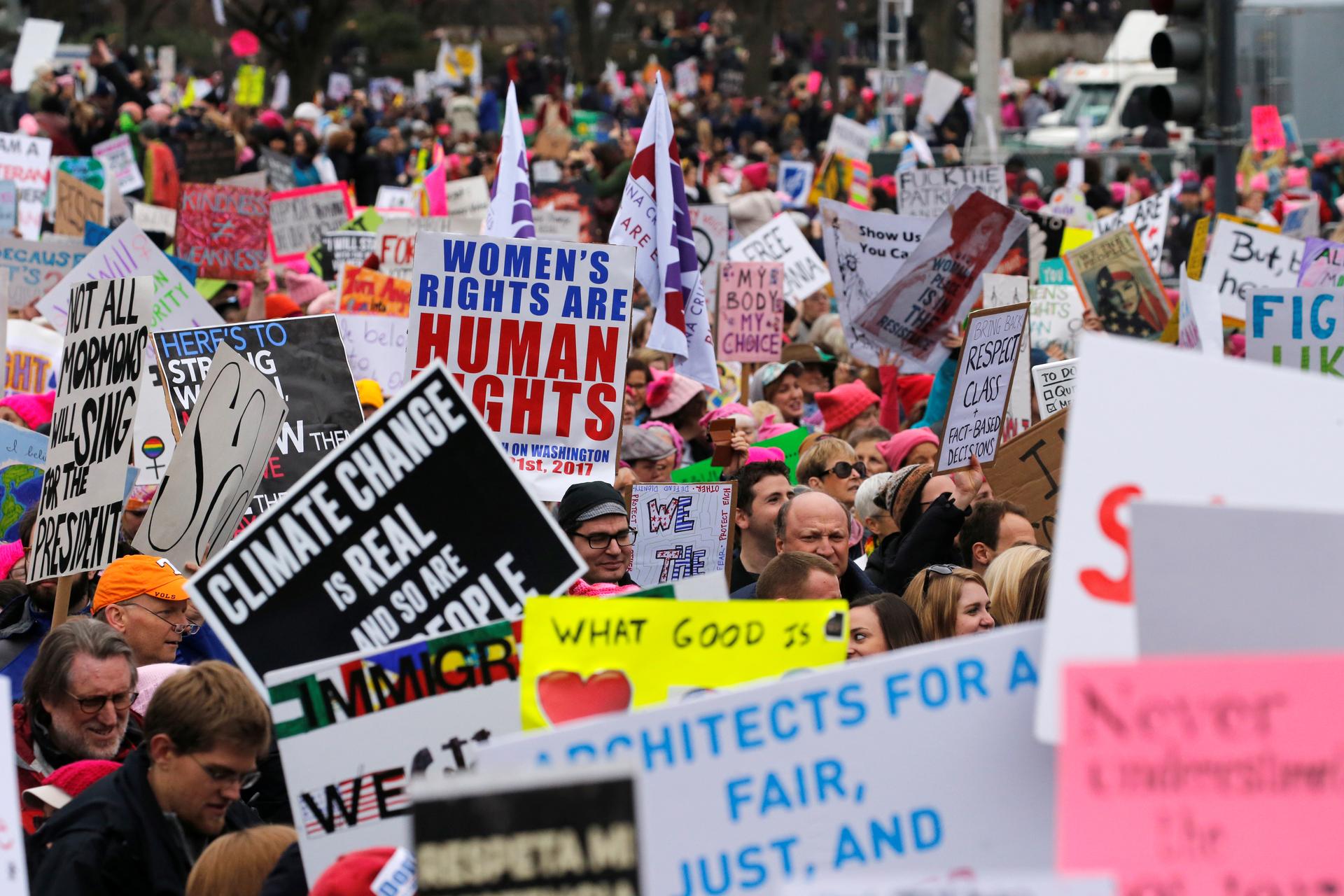Why is the world marching for science? It’s local issues, like budgets, education and food security.
Protesters at the Women's March on Washington in January, a pre-cursor to the March for Science.
The March for Science, happening Saturday in Washington, DC, started as a reaction to the Trump administration’s attitudes toward science. But since it was dreamed up in late January, the movement has spread well beyond the Beltway.
As of Friday afternoon, organizers say there are more than 600 demonstrations planned, including roughly 200 outside of the United States.
Science events — not all of them actual marches — are happening from the North Pole to Cape Town, from Bhutan to Greenland.
The international interest floored Kishore Hari, who’s coordinating the so-called satellite marches.
“When we started, I expected there might be 50 marches, and I thought they would all be in the US,” Hari says. “Quickly we were proved wrong because there was this flood of requests, especially from communities abroad that wanted to hold science marches for different reasons.”
In the US, scientists have long been wary of getting involved with politics. Since the November election, major science groups and high-profile scientists have urged the scientific community to get more involved with public policy.
The March for Science is, so far, the biggest public sign of this shift.
Organizers call the event “explicitly political” and are pushing for continued investment and promotion of science, and for science to play a greater role in policymaking.
But around the world, motivations for the march vary and are tied to local issues.
Renee Schroeder, a physicist at the Max F. Perutz Laboratories in Vienna says she’s marching against what she calls “anti-enlightenment” sentiments on the rise along with far-right and populist movements in Europe.
“I am concerned, and many people are concerned, that we have to speak up again for science and for rational decision,” Schroeder says. “All of these things we have been fighting for these last 50, 60 years.”
In France, organizers hope their events bring together science-minded voters and encourage them to head to the polls on Sunday in the country’s first-round presidential elections.
In Malawi, PhD candidate Tumaini Malenga is helping organize a rally at the University of Malawi.
She researches health behaviors among low-income people, and she wants the rally to raise awareness about the importance of international funding for Malawian doctors and researchers to help them fight disease.
“I’m from a developing country, and we have a multitude of public health problems, and it’s diseases that could be cured very simply,” Malenga says. “And if you remove the funding, that reverses a lot of years of progress that we’ve made.”
Nkechi Isaac, a journalist and fellow at the Nigeria Alliance for Science, is one of the organizers of the march in Nigeria’s capital Abuja. The event is being co-organized by the Open Forum for Agricultural Biotechnology and is largely focused on pushing for acceptance of genetically modified crops.
“We need science, especially when it comes to food security,” Isaac says. “We need GMOs, we need biotechnology to be able to feed the nation [and] growing population. That’s essentially why we are marching.”
And in Brazil, where the economy is struggling, physicist Tatiana Rappoport says the Rio demonstration she’s helping plan is just one recent public event orchestrated to protest huge cuts in the federal budget for science.
“Brazil had a cut in the science and technology budget of almost 50 percent this year,” says Rappoport, a professor at the Federal University of Rio de Janeiro. “And we are marching to make the public aware of these cuts and the consequence for the development of the country.”
Around the world, the demonstrations vary as much as the messages they hope to promote.
The Rio protest includes a “scissors orchestra,” where participants will gather to “play” scissors as an allusion to budget cuts.
The action in Singapore is not a march for science but a brunch for science, and in Accra, Ghana, organizers have a beach clean-up and speeches planned.
In Cape Town, where the affordability of higher education is a hot-button issue, the march will focus on access to STEM education for all and will end with a free visit to the Cape Town Science Centre.
The question, as with all large public demonstrations, is what happens in Rio, Cape Town and Washington, DC, after the rallies and speeches end. Does activism lead to action?
From the US perspective, organizers of the March for Science hope that coordinating global marches on the same day as the central march in Washington sends policymakers a message.
“If we let science decline in some way,” says Kishore Hari, “the world is looking at this.”
Every day, reporters and producers at The World are hard at work bringing you human-centered news from across the globe. But we can’t do it without you. We need your support to ensure we can continue this work for another year.
Make a gift today, and you’ll help us unlock a matching gift of $67,000!
